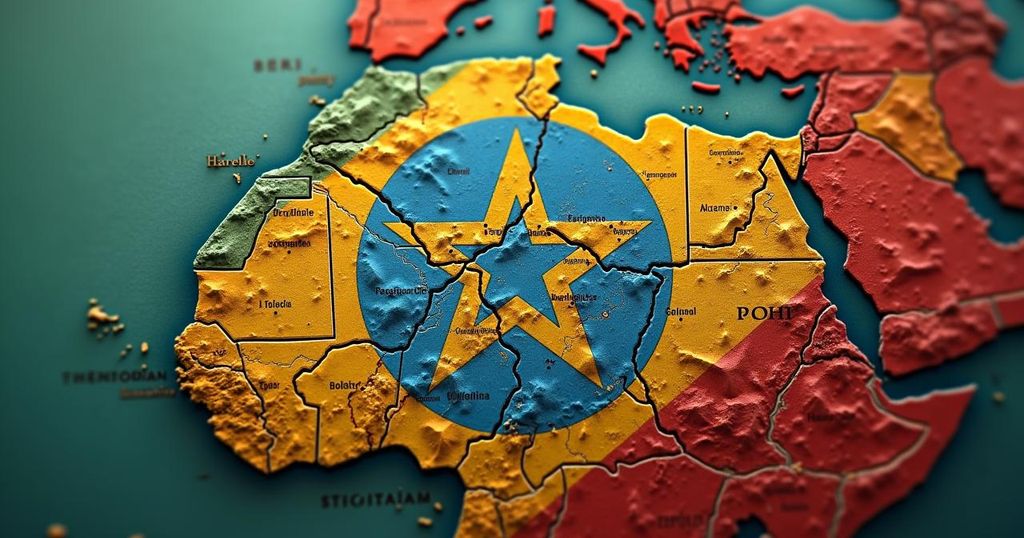Eritrea Strengthens Alliances Against Ethiopian Influence in the Horn of Africa
Eritrea’s President Isaias Afwerki hosted President Hassan Sheikh Mohamud of Somalia and President Abdel Fattah el-Sisi of Egypt in October to discuss countering Ethiopian interference in regional affairs. The leaders emphasized cooperation to enhance Somalia’s institutional capabilities against terrorism. Tensions have increased due to recent Ethiopian agreements with Somaliland, prompting Egypt to leverage its military relationships while Eritrea seeks to consolidate alliances against Ethiopia’s potential territorial ambitions. Expert analysis cautions against immediate military conflict, framing the current posturing as primarily diplomatic.
On 10 October, Eritrea’s president Isaias Afwerki convened a trilateral summit in Asmara with President Hassan Sheikh Mohamud of Somalia and President Abdel Fattah el-Sisi of Egypt. This landmark meeting centered on strategies to counteract external meddling in the domestic affairs of their nations and reinforce internal stability. A joint statement highlighted their commitment to enhance cooperation within Somali institutions to bolster its ability to address terrorism and safeguard its territorial integrity against encroaching threats. This summit emerges against a backdrop of worsening relations between Ethiopia and both Somalia and Eritrea. Tensions escalated when Ethiopia formalized an agreement with Somaliland, a declared republic that Somalia views as part of its territory, igniting concerns about potential Ethiopian territorial ambitions. Correspondingly, Egypt sees this as an opportunity to challenge Ethiopia’s influence, particularly regarding the controversial Grand Ethiopian Renaissance Dam (GERD), which Ethiopia proposes as vital for its development but which Cairo perceives as a threat to its Nile water resources. Egypt’s military collaboration with Somalia, including arms supplies and potential troop deployments to replace Ethiopian forces operating against Al-Shabaab, further complicates the regional dynamics. Somalia has issued ultimatums towards Ethiopian troop presence, demanding the annulment of the Somaliland agreement by year’s end. Eritrea’s historical alliance with Ethiopia during the Tigray conflict is strained post the peace deal made with TPLF in late 2022, as President Afwerki fears renewed Ethiopian ambitions regarding Eritrean ports, which Eritrea lost access to following its 1993 independence. Observers note Afwerki’s apprehension of direct conflict, suggesting he seeks reassurance through alliances with Ethiopia’s adversaries. While there are significant tensions, experts caution that military confrontation remains unlikely at present. Somalia’s military capacity is insufficient to engage Ethiopia effectively, and Egypt is currently preoccupied with its economic challenges and geopolitical instability in the Middle East. Individuals such as Omar Mahmood from the International Crisis Group suggest that the current posturing is more focused on diplomatic appearances rather than actual military engagements. There is, however, concern regarding the regression of relations between Eritrea and Ethiopia, as the earlier rapprochement efforts are now undermined, ushering back a state of animosity characterized by a tense stalemate. Analysts underscore the precarious nature of this evolving geopolitical landscape, foreshadowing potential implications for regional peace and stability.
The article assesses the complexities of current geopolitical relations between Eritrea, Somalia, and Egypt, specifically in the context of their shared concerns surrounding Ethiopia. A veteran leader, Isaias Afwerki is positioned amidst tensions stemming from Ethiopia’s strategic agreements with Somaliland, which Somalia considers a direct infringement upon its sovereignty. This meeting highlights the regional efforts to thwart foreign influence amidst ongoing political upheaval, arms exchanges, and military diplomacy.
In conclusion, the trilateral meeting between Eritrea, Somalia, and Egypt marks a significant diplomatic stride in response to the increased tensions with Ethiopia. While the collaboration aims to strengthen regional security against perceived threats, the realities of military engagement remain complex and fraught with challenges. The historical context of Eritrea’s relationship with Ethiopia, combined with Somalia’s precarious stance, paints a landscape that is both volatile and requires cautious navigation to prevent conflict escalation.
Original Source: www.theafricareport.com




Post Comment